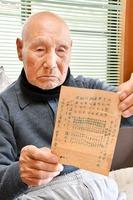Now for the 26th time. This time it's a story about a middle-aged doctor.
My countryside is in Kagoshima. It seems that it used to prosper in its own way, but now it is a samurai district that has lost much of the bustle of childhood. My grandfather, Hajime Kandabashi, was born at the end of the Meiji era and studied medicine at what was then known as Keijo Imperial University in South Korea.
When I returned to my hometown the other day, I came across a number of notebooks I had taken care of. For each field, the date and content of the lecture are written in a methodical handwriting. Here are the lecture notes for clinical medicine. I know it's a lecture on ascariasis, but I can barely read the rest. At that time, I can imagine my grandfather when he was young, frantically writing down lectures that were mixed with German.
My grandfather later became a military doctor and engaged in the Imphal operation. As many of you know, this strategy ended in a crushing defeat for Japan. It is said that 70% to 80% of the approximately 100,000 soldiers who served did not return alive. It seems that crossing the river on the way back was quite difficult, and that time was also mentioned in my grandfather's farewell poem.

After the war ended, he opened a practice in his hometown, where he worked as a surgeon for the rest of his life. I still remember the operating table (I think) in the middle of the tiled examination room that I saw when I was in kindergarten. Gastric cancer surgery is now an essential skill for surgeons. However, my grandfather, who was a military doctor, was able to operate on gastric ulcers, but did not have the opportunity to learn how to operate on stomach cancer. My grandfather used to say that one day he would like to see his children or grandchildren undergoing gastric cancer surgery while doing plaid. Some of his children and grandchildren are doctors, but he chose the path of surgery, becoming a psychiatrist, an anesthesiologist, and an industrial physician after repeating a year in another school. no one showed up. The feeling that my grandfather's dream was not finally fulfilled still remains in a corner of my heart.
The other day, there was a patient in my outpatient clinic who had just returned from Operation Imphal. Chief complaint is cold. Although he is over 90 years old, he has been able to walk with a strong spirit. While listening to his current illness history and life history, we started talking about the Imphal strategy. If you do the math, you're probably ten years older than your grandfather. He was fighting on the front lines, and I was shocked to hear that the environment was even tougher than my grandfather, who was a military doctor. I've heard a lot of stories that I can't write here, such as the friend I was talking to next to me suddenly suddenly died (I have permission to write this story from the person himself). I haven't seen you since then, but how are you doing?
By the way, when I wrote about my grandfather on SNS, I received a lot of comments saying, "My grandfather was a military doctor and served in the army." There was a striking similarity. Most of my grandfathers didn't want to talk about what happened on the battlefield. So did most of us, including my grandfather.
It was us, the grandchildren, who were even more surprised. Everyone, without a single person, is the first to jump out when called on a train or plane, "Is there a doctor?" If you see an emergency, treat it first. I also have people who hit a train and fell and lost consciousness, people who don't understand cardiopulmonary arrest, people who have epileptic seizures, which are rare these days, people who fall and bleed from the head, etc. I've been hit by the first aid of the person. Rather than out of a sense of ethical obligation, the first thing that comes to mind is the movement of the body. It seemed that everyone was "made" like that, even if it was at their own risk. I don't know why, but maybe the education passed down from my grandfather to my parents and myself has made us who we are today.
Looking at the notebooks left by my grandfather, I remember my grandfather when he was still alive and myself when I was a student when I was unserious. It's too different, but I'm sure I'm learning something from it. Maybe I'm telling my children something I'm not even aware of. That's what I'm thinking.
Koji KandabashiBorn in 1967, graduated from the Department of Mathematics, Faculty of Science, the University of Tokyo in 1992, and graduated from the Department of Medicine, Faculty of Medicine, the University of Tokyo in 1999. After training at the University of Tokyo Hospital Internal Medicine, he entered the University of Tokyo First Internal Medicine Department and the Hematology and Oncology Internal Medicine Department. After training at a hospital in Tokyo, from 2008 to 2011, Assistant Professor of the Department of Sterile Treatment, University of Tokyo Hospital. Since 2011, he has worked at Toshima Showa Hospital, and in 2015, established a joint company DB-SeeD.